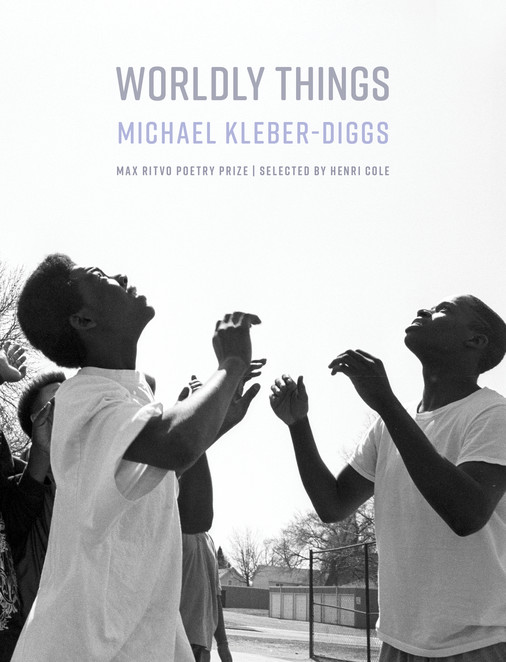

Michael Kleber-Diggs
Award-winning Poet & Memoirist
Max Ritvo Poetry Prize


Readings &
Lecture Topics
- An Evening with Michael Kleber-Diggs
Biography
“Kleber-Diggs’ poetry embraces the wondrousness of everyday existence. Poems of joy and celebration co-exit with elegies… He underscores that writing is itself an act of survival, a means of getting along in a universe that mixes joy with grief.” —Poetry Foundation
“I am captivated, consoled, and bowled over by Michael Kleber-Diggs’ poetry; knifelike in concision and oracular at the core.” —Tracy K. Smith
Michael Kleber-Diggs is a poet, memoirist, essayist, and literary critic. His debut poetry collection, Worldly Things (Milkweed Editions, 2021), won the Max Ritvo Poetry Prize. Most recently, he is the author of the forthcoming memoir My Weight In Water (Spiegel & Grau, 2026), an intimate story of race and recreation in America—of segregation, desegregation, and justice—told through one family and their lives in the Midwest.
In his debut collection of poems, Kleber-Diggs names delight in the same breath as loss. Moments suffused with love couple with moments of wrenching grief. With uncompromising candor, Kleber-Diggs documents the many ways America systemically fails those who call it home while also calling upon our collective potential for something better. Sonorous and measured, the poems of Worldly Things offer needed guidance on ways forward—toward radical kindness and a socially responsible poetics. “Sometimes,” Michael Kleber-Diggs writes, “everything reduces to circles and lines.” About this collection, Camille Dungy says, “When Michael Kleber-Diggs writes ‘my vision is common. / I dream about ordinary things—stuff that could actually happen,’ he seems to write directly into the heart of this collection. And that is exactly what is so extraordinary about these poems. Plain spoken and insisting on the direct gaze, Worldly Things unveils the world that’s right in front of us. The world that has been waiting, all this time, for someone to really see what is actually happening.”
Among other places, Kleber-Diggs’ writing has appeared or is forthcoming in Poem-a-Day, Poetry Daily, Poetry Northwest, Potomac Review, Hunger Mountain, Memorious, and various anthologies. His essay, “On the Complex Flavors of Black Joy,” is included in the anthology There’s a Revolution Outside, My Love: Letters from a Crisis, edited by Tracy K. Smith and John Freeman. His work has been nominated for a Pushcart Prize and Best of the Net and has been supported by the Minnesota State Arts Board, the Jerome Foundation, and the Metropolitan Regional Arts Council. Kleber-Diggs is a past Fellow with the Givens Foundation for African American Literature, a winner of the Loft Mentor Series in Poetry, and the former Poet Laureate of Anoka County libraries.
Since 2016, Michael has been an instructor with the Minnesota Prison Writing Workshop. He also teaches Creative Writing in Augsburg University’s low-res MFA program and at Saint Paul Conservatory for Performing Artists. He lives in St. Paul.
Short Bio
Michael Kleber-Diggs is a poet, essayist, and literary critic. His debut poetry collection, Worldly Things (Milkweed Editions, 2021), won the Max Ritvo Poetry Prize. Among other places, Kleber-Diggs’ writing has appeared or is forthcoming in Poem-a-Day, Poetry Daily, Poetry Northwest, Potomac Review, Hunger Mountain, Memorious, and various anthologies. Since 2016, Michael has been an instructor with the Minnesota Prison Writing Workshop. He also teaches Creative Writing in Augsburg University’s low-res MFA program and at Saint Paul Conservatory for Performing Artists. He lives in St. Paul.
Visit Author WebsiteVideos
Publications
My Weight In Water
Memoir, 2026
Michael Kleber-Diggs and his twin brother, Martin, grew up in Kansas City, their family part of a prosperous community of Black medical professionals. Their father had never learned to swim, so when he wanted to buy a boat, their mother, a former lifeguard, agreed on the condition that her sons take swimming lessons. Then their father was murdered in an act of random violence, and everyone’s lives changed—but for Michael, in the years and moves that followed, swimming remained a constant.
My Weight in Water is the intimate memoir of a swimmer. It is a story of race and recreation in America—of segregation, desegregation, and justice—told through one family and their lives in the Midwest. It is a reckoning with the concept of self-care and a plea for joy. Most of all, it is a book about what it means to love an activity that leaves you vulnerable—your mostly unclothed body in close proximity to other mostly unclothed bodies, moving through the same water—when you are marked as an outsider by both your race and your size.
Transparently and gloriously written, My Weight in Water is a definitively American work about what it costs one swimmer to enter the pool and why he does it anyway—imagining a future where all people have access to an activity that renders us weightless.
Worldly Things
Poetry, 2021
In these poems, Kleber-Diggs names delight in the same breath as loss. Moments suffused with love―teaching his daughter how to drive; watching his grandmother bake a cake; waking beside his beloved to ponder trumpet mechanics―couple with moments of wrenching grief―a father’s life ended by a gun; mourning children draped around their mother’s waist; Freddie Gray’s death in police custody. Even in the refuge-space of dreams, a man calls the police on his Black neighbor.
But Worldly Things refuses to “offer allegiance” to this centuries-old status quo. With uncompromising candor, Kleber-Diggs documents the many ways America systemically fails those who call it home while also calling upon our collective potential for something better. “Let’s create folklore side-by-side,” he urges, asking us to aspire to a form of nurturing defined by tenderness, to a kind of community devoted to mutual prosperity. “All of us want,” after all, “our share of light, and just enough rainfall.”
Sonorous and measured, the poems of Worldly Things offer needed guidance on ways forward―toward radical kindness and a socially responsible poetics.
Articles & Audio
Read What’s In Print
• Letter From St. Paul: On the Complex Flavors of Black Joy by Michael Kleber-Diggs – LitHub
• Review of Worldly Things Michael Kleber-Diggs – Poetry Foundation
• Michael Kleber-Diggs on Connecting to the World Through Poetry – LitHub
• Here, Our Sweet Rustlings: A Conversation with Michael Kleber-Diggs – The Adroit Journal
• Poet Michael Kleber-Diggs: I want to be understood by as many people as possible – MINNPOST
Listen to Audio
• New Book Expresses Still-Fresh Feelings About A Tumultuous Year – NPR
• Tracy K. Smith and Michael Kleber-Diggs: History is upon us, its hand against our back – On Being
Selected Writings
• Read “Grinding Down to Prayer” by Michael Kleber-Diggs
Every Mourning
Morning: walking my neighborhood, I come upon a colony
of ants busy at work. I take care not to step on any and miss
them all, then encounter up a ways a fellow traveler greeting
the day. I am frightening her. No. She is afraid of me.
Is she an introvert? Is she a neighbor? Is she just in from the ’burbs,
from the country? Is she scared of the inner city? Am I the inner city?
Is she racist? Shouldn’t I be the wary one? Or is she a survivor
like me? It can’t be what I’m wearing: khakis, a blue and white
checkered button-down shirt, and the nylon sandals I favor
because they’re comfortable, my feet can breathe in them.
Dear friends, I am the nicest man on earth.
And I want to shout, Morning! But just then a weaver or
carpenter, just then a pharaoh or fire or pavement, just
then a little black ant struggles by alone, alone. And
in that moment, I want us to give ourselves over
to industry, carry the weight of the day together, lighten
it. I want to be a part of a colony where I feel easy
walking around. Cool as the goddamn breeze. Where
I can breathe, build structures sturdier and grander
than this — but the woman crosses to the other side
of the street, and I do what I usually do: retreat into
myself as far as I can, then send out whatever’s left.

